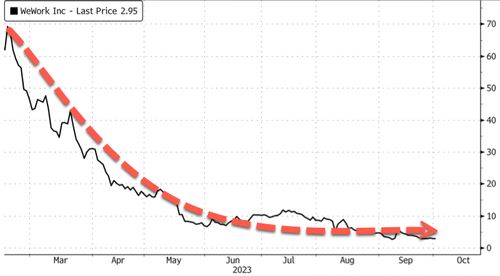WeWork On Brink Of Default As $95 Million In Interest Payments Skipped
WeWork Inc. skipped interest payments totaling $95 million due on Monday on five of its bonds, triggering a 30-day grace period. This comes two months after the struggling co-working start-up warned that "substantial doubt exists" about staying in business and one month after WeWork CEO David Tolley said the company "will seek to negotiate terms with our landlords" for underperforming locations.
"As such, today we entered into the 30-day grace period provided to us under our secured notes' indentures and withheld the associated interest payments," WeWork wrote in a press release on its website on Monday.
A regulatory filing shows the co-working firm withheld $37.3 million of cash and $57.9 million of interest payments on the following notes, all due in 2027:
- 15.000% First Lien Senior Secured PIK Notes due 2027;
- 11.000% Second Lien Senior Secured PIK Notes due 2027;
- 11.000% Second Lien Exchangeable Senior Secured PIK Notes due 2027;
- 12.000% Third Lien Senior Secured PIK Notes due 2027; and
- 12.000% Third Lien Exchangeable Senior Secured PIK Notes due 2027.
The filing continued, "The Company has a 30-day grace period to make the Interest Payments before such non-payment constitutes an "event of default" with respect to the Notes."
It added: "The Company has the liquidity to make the Interest Payments, and may in the future decide to do so."
If WeWork has enough liquidity to service its debt, why would it miss payments?
Perhaps a conversation the WeWork CEO had with The New York Times can shed some light on this question:
"I believe they will absolutely understand our decision to enter into the grace period," WeWork's interim chief executive, David Tolley, said in an interview. He called the move "typical" as a "precursor to a conversation."
"Skipping an interest payment is not necessary to negotiate with lenders. But it is a move sometimes used by indebted companies to put pressure on lenders to restrike deals under more favorable terms," NYTimes noted.
In early September, Tolley said the co-working start-up "will seek to negotiate terms with our landlords" and "part of these negotiations, we expect to exit unfit and underperforming locations and to reinvest in our strongest assets as we continuously improve our product."
A month before that, WeWork shares crashed after the company stated in a filing:
...as a result of the Company's losses and projected cash needs, combined with increased member churn and current liquidity levels, substantial doubt exists about the Company's ability to continue as a going concern.
The Company's ability to continue as a going concern is contingent upon successful execution of management's plan to improve liquidity and profitability over the next 12 months, which includes, without limitation:
- Reducing rent and tenancy costs via restructuring actions and negotiation of more favorable lease terms;
- Increasing revenue by reducing member churn and increasing new sales;
- Controlling expenses and limiting capital expenditures; and
- Seeking additional capital via issuance of debt or equity securities or asset sales.
WeWork shares have been in freefall for most of the year.
Covid killed the flexible office industry. WeWork might be on its last leg.



